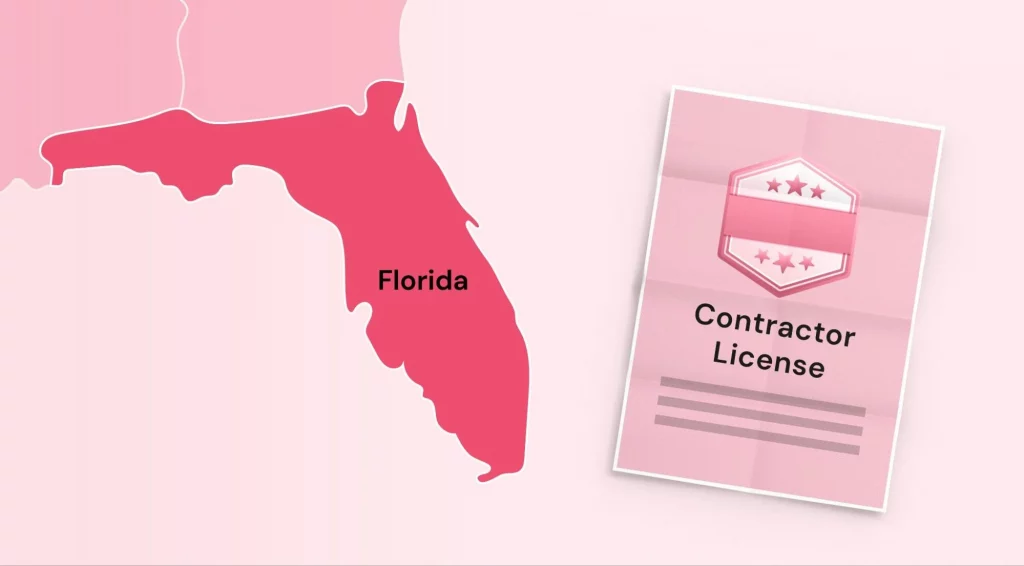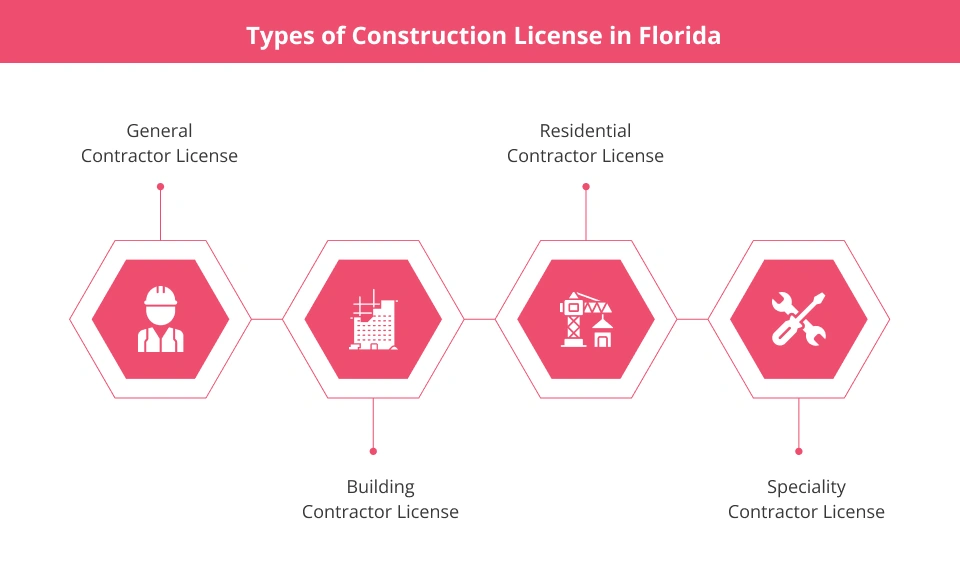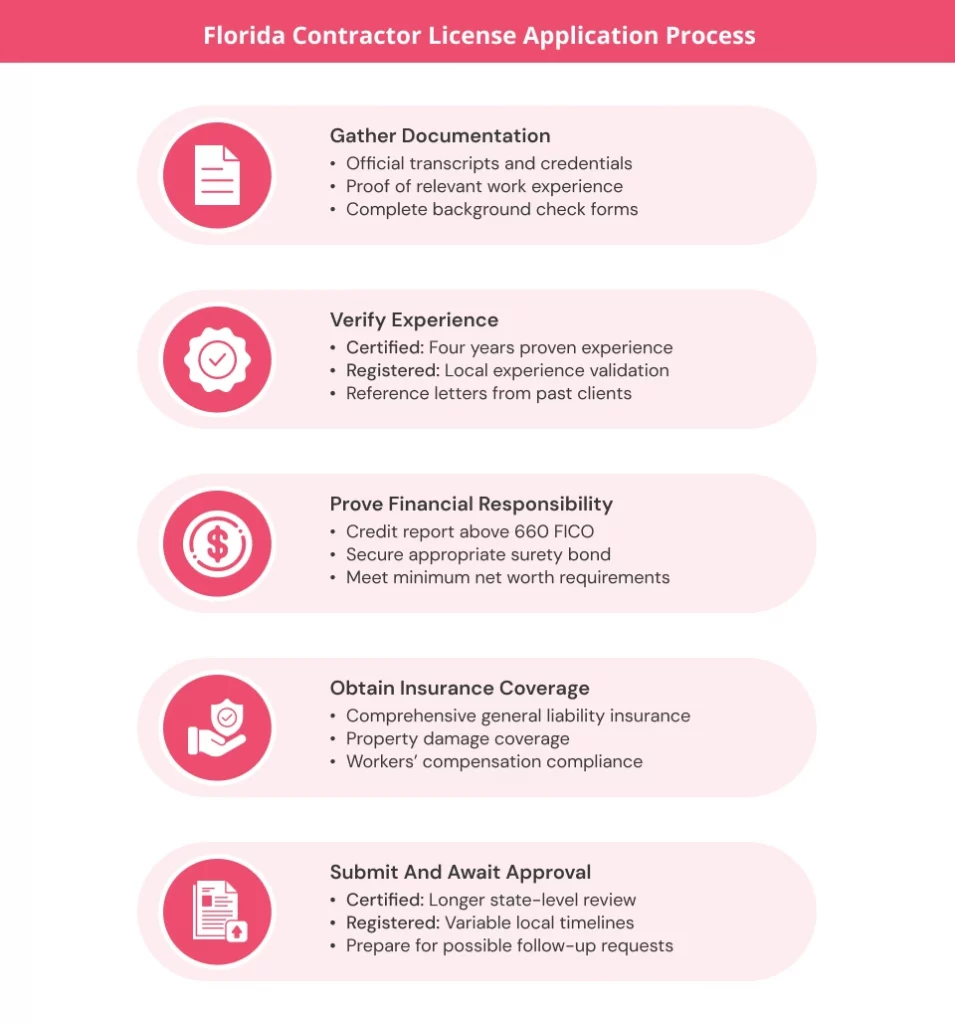In the Sunshine State, you cannot legally swing a hammer on a paid project without the right license. Whether you are a seasoned builder expanding your footprint or a newcomer entering the trade, understanding the process of obtaining a Florida contractor license is non-negotiable.
Florida’s contractor license process presents both opportunities and challenges for construction professionals. The state’s dual licensing approach segregates contractors into certified and registered categories that directly impact where you can work and which projects you can legally undertake.
As a contractor working in Florida, navigating these licensing distinctions is crucial for business growth. Certified contractors can work anywhere in the state, while registered contractors are limited to certain local areas. Choosing the right license helps you stay compliant and expand your work across Florida’s varied construction markets.
This Florida contractor license guide breaks down what each license type means, how you can qualify, and which option best fits your objectives. Keep reading to learn more.
 What are the different Florida Contractor License Types?
What are the different Florida Contractor License Types?
Florida’s distinctive dual licensing approach was designed to strike a balance between local control and consistent statewide standards. Over the years, it has adapted to keep pace with new construction methods and technologies, while still maintaining its core structure.
Here are the different Florida contractor license types you will encounter depending on your intended scope of work.
- General Contractor License: Authorizes construction, remodeling, repair, or improvement of commercial buildings and residential buildings of three or more units.
- Building Contractor License: Permits construction, remodeling, repair, or improvement of commercial buildings and residential buildings limited to three stories or less.
- Residential Contractor License: Allows construction, remodeling, repair, or improvement of one, two, or three-family residences not exceeding two stories in height.
- Specialty Contractor Licenses: Cover specific trades like plumbing, electrical, HVAC, roofing, swimming pool installation, solar heating systems, gutter systems, and numerous other specialized construction services.
The Florida Department of Business and Professional Regulation (DBPR) serves as the primary governing body for contractor licensing through its Florida Construction Industry Licensing Board (CILB). The board enforces all Florida statutes related to contractor qualifications and practices.
Local licensing boards in counties and municipalities also play crucial roles for registered contractors. These entities work together to enforce standards, process applications, and ensure compliance with state and local building codes.
|
What are the Differences Between Certified vs. Registered Licenses in Florida?
Understanding these fundamental distinctions helps you select the Florida contractor license that aligns with your business aspirations.
| Feature | Certified Contractors | Registered Contractors |
| Application Process | Submit directly to state DBPR with proof of passing state exams and financial stability documentation. | Obtain local competency card first, then register with state DBPR using proof of local authorization. |
| Geographic Scope | Authorized to work anywhere in Florida without additional local permits or licenses. | Limited to working only in specific jurisdictions where local competency has been demonstrated and approved. |
| Examination Requirements | Must pass comprehensive state-level business and trade knowledge exams administered by DBPR. | Must pass local competency exams specific to the jurisdiction where work will be performed. |
| License Costs | Higher initial fees ($200-$250) plus examination costs, but single statewide authority. | Lower initial state fees ($100-$200) but multiple local licensing fees required for multi-jurisdiction work. |
| Renewal Cycle | Renew every two years on August 31 of even-numbered years with 14 hours of continuing education. | Renew every two years on August 31 of odd-numbered years with 14 hours of continuing education. |
| Insurance Requirements | Stricter financial stability requirements including higher net worth minimums and liability coverage. | May have less stringent financial requirements at state level, but must meet local insurance mandates. |
What are Florida Contractor License Requirements for Certified Contractors?
Florida’s certified contractors represent the highest tier of licensing available in the state’s construction industry. These professionals possess certificates of competency issued directly by the Department of Business and Professional Regulation (DBPR). This type of Florida contractor license grants legal authority to perform contracted work in all 67 counties of Florida without additional local licensing requirements.
1. Pass the Required State Examination Requirements
You will need to demonstrate your professional competency through Florida’s comprehensive testing program before receiving your contractor license.
The Florida contractor licensing certification process tests your knowledge through comprehensive state-administered examinations that evaluate both trade expertise and business acumen.
Professional testing includes specialized exams for roles like plumbing contractor and electrical contractor, as well as niche specialties such as tank lining applicator and precision tank tester.
- Pass both business/finance and trade knowledge examinations, demonstrating your mastery of construction principles and regulations, as per the CILB instructions. The interested candidates can apply here.
- The business portion covers contract law, project management, lien law, and essential financial practices.
Trade-specific tests evaluate technical knowledge relevant to your contractor classification and specialty.
2. Submit Your Documentation and Application
You have to gather and present extensive documentation to verify your qualifications and experience as part of the Florida contractor license application. This helps the authorities verify your qualifications, experience, and good standing. The thorough vetting helps maintain integrity in the construction industry.
- Verify your experience: Document at least four years of experience (verifiable) or equivalent education in your trade specialty.
- Demonstrate financial stability: Submit credit reports, financial statements, and proof of required net worth.
- Complete background screening: Undergo fingerprinting to ensure you meet moral character requirements for certification. More official information is available here.
- Provide insurance documentation: Submit proof of liability insurance, required business entities, insurance coverage, and compensation insurance compliance.
- Pay application fees: You can apply either online through the Florida DBPR website or offline by downloading the form and mailing the application, documents and fees to the DBPR office in Tallahassee. Include fees ranging from $200-$250 with your submission to the Construction Industry Licensing Board.
Your complete application undergoes careful review by licensing specialists in Florida before certification approval can be granted.
3. Meet Financial Responsibility and Insurance Requirements
You must satisfy several financial and insurance mandates to protect both your business and potential clients.
Florida law establishes strict financial standards for certified contractors to protect both consumers and your business.
- General liability insurance minimums range from $300,000 to $500,000, depending on your specific license classification.
- Workers’ compensation coverage is mandatory unless you qualify for an exemption under specific circumstances.
- Maintain a minimum net worth between $2,500 and $20,000 based on your contractor classification.
- Professional liability insurance may be required for specific specialty contractor categories with design responsibilities.
- Financial stability verification includes credit reports showing scores typically above 660 to avoid additional requirements.
4. Leverage Your Statewide Working Privileges
Once certified, you can take advantage of the geographic freedom to work anywhere in Florida without additional local licensing.
Certified contractors enjoy unmatched geographic flexibility to pursue projects throughout Florida’s diverse regions.
- Bid freely on projects in any Florida county without obtaining additional local licenses or permits.
- Marketing efforts can target statewide audiences rather than specific local jurisdictions only.
- Hurricane recovery and disaster response work becomes more accessible with statewide authorization credentials.
How To Get A Florida Contractor License as a Registered Contractor?
Florida registered contractors operate under a different licensing framework that ties their work authorization to specific local jurisdictions. These professionals obtain their competency credentials at the county or municipal level before registering with the state.
Your registered status under the Florida contractor licensing allows you to perform work only within the specific jurisdictions where you hold local competency cards.
Step#1: Complete Local Competency Verification
The foundation of registered contractor status begins with proving your professional competency through local testing and certification programs.
- Take and pass a competency examination administered by your local county or municipal licensing board.
- Local tests typically focus on area-specific building codes and construction regulations applicable to that jurisdiction.
- Experience requirements generally include 3-4 years of documented work in your trade specialty.
- Most jurisdictions require reference letters from previous employers or clients verifying your expertise.
- Technical interviews with local licensing officials may supplement written examination requirements.
Step#2: Register with the State After Local Approval
Once you have obtained local competency certification, the state registration process formalizes your status as a registered contractor.
- Submit the proof of your local competency card or certificate to the state licensing board.
- Background checks similar to those for certified contractors verify your professional standing and character.
- Financial responsibility requirements may be less stringent than for certified contractors in some categories.
- Registration fees average $100-$200 depending on your specific contractor classification and specialty.
- Your registration information becomes publicly searchable through the DBPR’s online contractor verification system.
Step#3: Manage Multiple Jurisdiction Authorizations
Many registered contractors need to work across multiple counties or municipalities, requiring separate authorizations from each local licensing authority
- Research all specific requirements for each jurisdiction where you plan to perform work.
- Application fees and renewal schedules vary significantly between different counties and municipalities.
- Some jurisdictions offer reciprocity agreements that recognize competency cards from neighboring areas.
Step#4: Understand Geographic Limitations and Their Business Impact
As a registered contractor, your business operations face geographic constraints that certified contractors don’t encounter. These limitations can significantly impact growth strategies and market positioning.
- Turn down project opportunities outside your authorized jurisdictions unless you obtain additional local licenses.
- Marketing materials must carefully specify your approved work areas to avoid misrepresentation claims.
- Partnership agreements with contractors in different jurisdictions may become necessary for larger projects.
|
How to Choose the Right Florida Contractor License?
Determining which license type best suits your contracting business requires thoughtful analysis of your current situation and future aspirations.
- Service Area Considerations: If you plan to operate in multiple counties or statewide, pursue certification despite higher initial costs. The ability to work anywhere in Florida without additional licensing creates significant operational freedom and eliminates geographic constraints on your growth potential.
- Financial Investment Analysis: Registered licensing offers lower initial costs for contractors focusing on a single jurisdiction, reducing startup barriers. However, expansion to other areas requires additional local competency cards and fees, potentially making certification more cost-effective for growing businesses planning multi-county operations.
- Business Volume and Project Scale: Smaller contractors handling primarily residential projects within a single county may find registration sufficient for their needs. The lower initial investment and simpler application process allow you to establish your business quickly while focusing your expertise on local building codes and requirements.
- Growth Trajectory Planning: Forward-thinking contractors should consider certification as part of a long-term business strategy even if initially operating locally. Starting with registration allows you to build experience and financial stability while working toward certification requirements, creating a natural progression path for your business development.
- Market Positioning Strategy: Certified status often carries greater prestige and client confidence due to its more rigorous requirements and statewide recognition. Your marketing can leverage this credential to differentiate your business from competitors, potentially commanding premium pricing and attracting higher-profile projects requiring demonstrated expertise.
How Much is the Florida Contractor License Cost?
Here is a breakdown of the Florida contractor license cost for you:
| License Type | Application Fee | Exam Fee (per part) | Other Costs (fingerprinting, insurance, etc.) |
| Certified Contractor | $95–$245 | Appx $135 x 3 | Varies (fingerprinting appx. $56, insurance varies) |
| Registered Contractor | $155–$305 | Varies by locality | Local fees, insurance, fingerprinting |
- General Liability Insurance: Florida law requires contractors to carry general liability insurance. The minimum coverage amounts are:
- $300,000 for bodily injury and $50,000 for property damage for general and building contractors.
- $100,000 for bodily injury and $25,000 for property damage for most other contractor types (such as residential, roofing, plumbing, etc.)
- Contractors may also provide a combined single limit policy (e.g., $300,000) or higher coverage depending on project requirements.
- Workers’ Compensation Insurance: Mandatory for all contractors with employees, regardless of the number of employees. This covers medical expenses and lost wages for employees injured on the job. Not having this insurance can result in severe penalties.
- Proof of Insurance: Contractors must provide a Certificate of Insurance when applying for or renewing a license, and this certificate must be kept up to date and available at job sites
- Surety Bonds: The required bond amount for Florida contractor license bonds depends on the license category:
- $20,000 bond for Division I Contractors
- $10,000 bond for Division II Contractors
Contractors can lower these bond amounts by 50% by completing a course in financial responsibility.
How Long Does It Take to Get a Contractor License in Florida?
From start to finish, the time required to obtain a Florida contractor license can take between 4 and 6 months; however, this timeline does not include the 4 years of experience in the workplace necessary to qualify for the exam.
The timeline depends on:
- How quickly you meet the experience and education requirements.
- The time needed to prepare for and pass the required exams.
- The speed of background checks, application reviews, and insurance procurement.
- State processing times that can fluctuate based on demand.
How to Apply for a Florida Contractor License?
Both license types require careful preparation and documentation, though the specific requirements differ significantly. Here’s how the process looks:
 How to Maintain Your Florida Contractor License?
How to Maintain Your Florida Contractor License?
Obtaining your contractor license is just the first step. Florida requires ongoing commitment to professional development and strict adherence to renewal schedules. Staying compliant is crucial for continuous operation.
- Continuing Education Requirements: Both license types require completion of 14 hours of continuing education during each two-year renewal cycle. These educational activities have to include courses on Florida building code updates, workplace safety standards, business practices, and workers’ compensation requirements to maintain your license validity.
- Differentiated Renewal Schedules: Certified licenses expire on August 31 of every even-numbered year. Registered licenses, conversely, expire on August 31 of every odd-numbered year, requiring careful tracking.
- Mandatory Course Content: Your continuing education should cover specific subjects, including workplace safety, workers’ compensation, business practices, and Florida building code changes. This ensures your knowledge remains current.
- License Lapse Consequences: Allowing your license to lapse can lead to fines and inability to legally contract work. Reinstatement often involves additional fees, completing all missed CE, and reapplying after a certain period.
- Digital Compliance Management:>Modern contractors increasingly utilize digital tools like floor plan creators and 3D visualization software to track continuing education credits and maintain compliance records.
Final Words
Distinguishing between Florida’s registered and certified contractor licenses is fundamental for any aspiring or established professional. Certified licenses offer statewide authority and broad project scope, while registered licenses are localized, serving specific community needs.
Align your choice directly with your business goals, target service area, and long-term growth aspirations. An informed decision ensures compliance and unlocks your full potential within Florida’s dynamic construction industry.
To boost your business further, tools like Foyr Ideate can transform how you plan and present projects. Our AI-powered platform lets you create photorealistic 3D designs and 360° walkthroughs from simple text prompts, helping you communicate your vision clearly to clients. Whether you’re bidding on a Miami high-rise or a Tampa residential remodel, Foyr Ideate streamlines project planning by helping you:
- Generate professional-grade renders to showcase layouts and finishes, ensuring client alignment before construction begins.
- Access a catalog of over 60,000+ products to align designs with budgets and simplify procurement.
- Customize designs in real-time and impress clients with immersive visuals, giving you a competitive edge to win the bid.
Sign up for a 14-day free trial and discover how this intuitive platform can help your contractor work in Florida.
DISCLAIMER: This guide is informational. Licensing regulations change frequently. Always confirm current requirements with the Florida Department of Business and Professional Regulation (DBPR) or your local building department before making decisions based on this information.
FAQs About Florida Contractor License
How difficult is it to obtain a contractor’s license in Florida?
The process is challenging but achievable with proper preparation. Most candidates require 3-6 months of study to pass the required examinations successfully. The experience requirements and financial prerequisites create additional hurdles for new professionals.
Can you be a contractor without a license in Florida?
No. Performing contractor work without proper licensing is illegal and subject to significant penalties. Even minor projects requiring permits must be handled by licensed contractors, as mandated by Florida statutes.
What is the pass rate for the Florida general contractor exam?
The pass rate for the Florida general contractor exam is generally just over 50% across all three required tests. The Business and Finance exam specifically has a pass rate of about 70%.





 How to Maintain Your Florida Contractor License?
How to Maintain Your Florida Contractor License?




